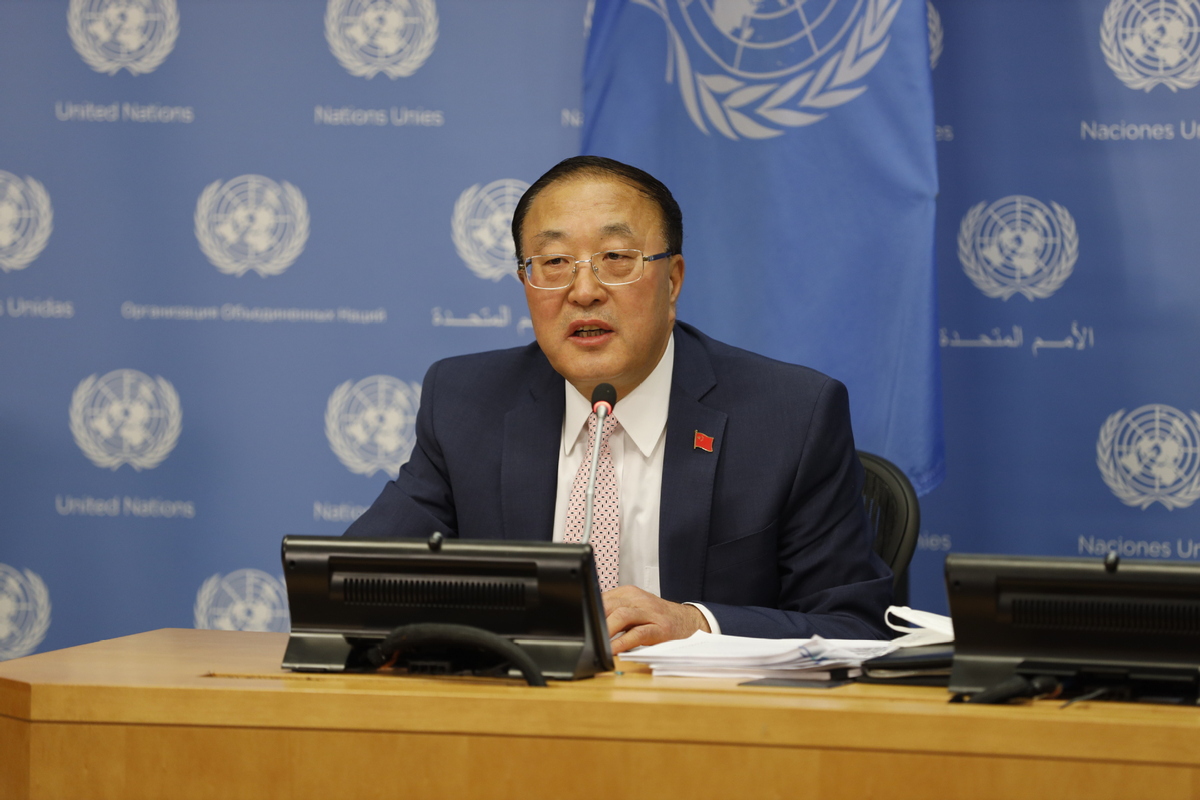
China proposed five solutions to prevent the potential risks and conflicts by the application of emerging technologies, during an informal meeting at the United Nations on Monday.
"The rapid development of emerging technologies is leading to a new round of scientific and technological revolution and injecting strong impetus into human progress. They bring both opportunities and challenges," said Ambassador Zhang Jun, permanent representative of China to the UN.
He made the remarks at "The Impact of Emerging Technologies on International Peace and Security" meeting. The conference, held at the initiative of China, presidency of the Security Council for the month of May, was the first ever Arria-formula meeting on emerging technologies.
Zhang, who chaired the meeting, said China has proposed five solutions to find better ways to develop, use and govern emerging technologies to allow them to benefit people around the world while keeping risks under control.
First, Zhang said, is the need to promote innovation-driven development and comprehensively improve the development and application of science and technology in all countries to narrow the digital divide.
"All countries must be fully engaged in the process of global technological development, to ensure that the advances in science and technology benefit all, especially developing countries," Zhang emphasized.
Zhang suggested that the international community strengthen capacity-building through the application of emerging technologies to raise all countries' capabilities to fight the pandemic, tackle climate change and maintain food, energy and data security.
Second, Zhang said, is the need to create favorable conditions to encourage healthy competition and prevent the monopoly on technology. All countries should pursue open development and meet the challenges in the process of development.
"Unilateralism, protectionism and technological hegemony should be firmly opposed. We need to uphold international fairness and justice, promote equal and mutually beneficial cooperation, and avoid blockages and barriers to technology," said the ambassador.
Third, Zhang said, is the need to strengthen global governance to better regulate the development and application of emerging technologies. More efforts should be made to formulate relevant international instruments to fill the gaps in rules, norms and order, he said.
"State governments should consult together, contribute together and share benefits together. We should practice multilateralism, encourage active participation of multiple stakeholders and increase dialogue and cooperation to jointly formulate international norms and rules on emerging technologies," he said.
Fourth, said Zhang, we need to fully recognize the potential risks and challenges of emerging technologies to better maintain international peace and security.
He suggested that the international community ensure that technological innovation complies with the law and universally recognized international norms.
"We must ensure emerging technologies are of the people, by the people and for the people. Special attention should be paid to the use of emerging technologies in armed conflicts," he said.
"We must prevent emerging technologies from falling into the hands of terrorist groups or being used to spread disinformation and hate speech. It is necessary to strengthen the use of emerging technologies in UN peacekeeping operations," he continued.
Fifth, Zhang said, is the need to strengthen coordination to support the central role of the UN. The UN should pay more attention to emerging technologies, and further study and explore the establishment of a democratic, transparent and inclusive framework for international cooperation and governance from the perspectives of peace, development and security, he said.
Zhang pointed out that UN agencies should strengthen coordination to better seize opportunities and tackle the risks and challenges brought by emerging technologies.
UN officials such as Izumi Nakamitsu, UN under-secretary-general and high representative for disarmament affairs, and Maria Francesca Spatolisano, UN assistant secretary-general for policy coordination and inter-agency affairs for the Department of Economic and Social Affairs (DESA) also briefed the meeting on the impact of emerging technologies on international peace and security in light of their respective work and areas of research.
Monday's Arria-formula meeting is a flexible and informal mechanism for Security Council members to exchange views with UN member states and interested parties on issues of common concern.
The meeting was co-hosted by Egypt, Kenya, Mexico, South Africa and the United Arab Emirates. More than 40 representatives from the member states, including Security Council members, attended the meeting.
Emerging technologies are technologies whose development and application are still largely unrealized. They include at least the following four categories: artificial intelligence, digital technology, biotechnology and material technology.













